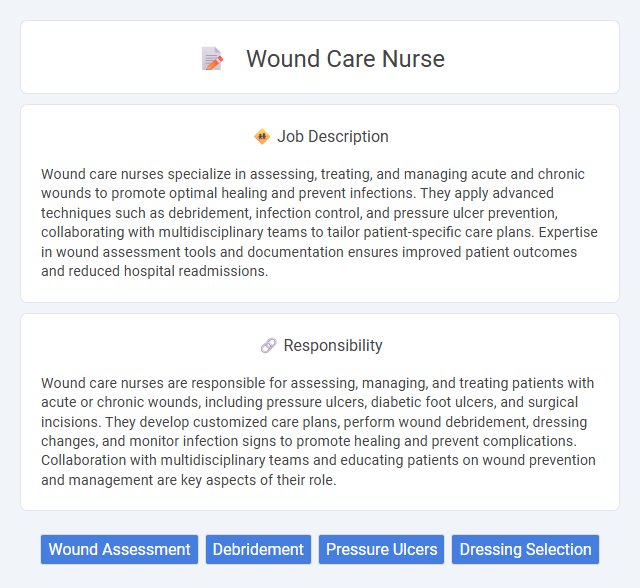
Wound care nurses specialize in assessing, treating, and managing acute and chronic wounds to promote optimal healing and prevent infections. They apply advanced techniques such as debridement, infection control, and pressure ulcer prevention, collaborating with multidisciplinary teams to tailor patient-specific care plans. Expertise in wound assessment tools and documentation ensures improved patient outcomes and reduced hospital readmissions.
Individuals with strong empathy and resilience are likely well-suited for a wound care nurse role, as they frequently encounter patients with chronic wounds or complex medical conditions requiring ongoing attention and compassion. Those comfortable with physical demands and meticulous care procedures probably fit this job better, considering the necessity for precise dressing changes and infection control practices. People with a preference for dynamic healthcare settings and continuous learning may find satisfaction and success in wound care nursing.
Qualification
A wound care nurse must possess specialized training in wound management, often including certifications such as the Certified Wound Care Nurse (CWCN) credential. Essential qualifications include a registered nursing (RN) license, knowledge of advanced wound treatment techniques, and proficiency in assessing and managing chronic and acute wounds. Experience in patient care, familiarity with infection control practices, and strong clinical decision-making skills are critical for effective wound care nursing.
Responsibility
Wound care nurses are responsible for assessing, managing, and treating patients with acute or chronic wounds, including pressure ulcers, diabetic foot ulcers, and surgical incisions. They develop customized care plans, perform wound debridement, dressing changes, and monitor infection signs to promote healing and prevent complications. Collaboration with multidisciplinary teams and educating patients on wound prevention and management are key aspects of their role.
Benefit
Wound care nurse jobs likely offer significant benefits such as competitive salaries and comprehensive health insurance. Opportunities for professional growth and specialized training in wound management may also be included. Flexibility in work schedules and the chance to make a direct impact on patient recovery could further enhance job satisfaction.
Challenge
Wound care nurses likely face the challenge of managing complex and chronic wounds that require meticulous assessment and treatment strategies. They probably encounter difficulties in tailoring care plans to diverse patient needs while ensuring infection control and promoting healing. It is probable that staying updated with evolving wound care technologies and practices adds another layer of complexity to their role.
Career Advancement
Wound care nurses specialize in advanced patient treatment techniques that significantly increase demand for their expertise in hospitals and outpatient clinics. Gaining certifications such as Certified Wound Care Nurse (CWCN) or pursuing a master's degree in nursing facilitates higher positions like wound care coordinator or nurse practitioner. Career advancement in this field offers opportunities to lead clinical research, develop care protocols, and influence healthcare policy related to wound management and recovery outcomes.
Key Terms
Wound Assessment
Wound care nurses specialize in precise wound assessment by evaluating the size, depth, tissue type, and signs of infection to develop effective treatment plans. They use advanced tools like wound measurement devices and imaging technologies to monitor healing progress and adjust care accordingly. Thorough documentation and patient education on wound management are essential for promoting recovery and preventing complications.
Debridement
Wound care nurses specialize in managing and treating chronic and acute wounds through advanced techniques, including debridement, which involves removing dead or infected tissue to promote faster healing. Proficiency in various debridement methods such as sharp, enzymatic, autolytic, and mechanical debridement is essential to tailor care based on wound characteristics and patient needs. Expertise in assessing wound depth, infection risk, and tissue viability allows wound care nurses to optimize treatment plans and improve patient outcomes effectively.
Pressure Ulcers
Wound care nurses specializing in pressure ulcers perform crucial assessments and implement evidence-based interventions to prevent and treat these chronic wounds, often found in immobilized or elderly patients. They utilize advanced wound care techniques, such as debridement, dressings, and pressure redistribution devices, to promote healing and reduce complications. Proficiency in patient education and interdisciplinary collaboration enhances outcomes by minimizing infection risks and preventing ulcer recurrence.
Dressing Selection
Wound care nurses play a critical role in dressing selection by evaluating wound type, size, and exudate level to promote optimal healing. They choose dressings such as hydrocolloids, foams, alginates, or antimicrobial options based on wound characteristics and infection risk. Proper dressing selection prevents complications, reduces healing time, and improves patient outcomes in chronic and acute wounds.
 kuljobs.com
kuljobs.com